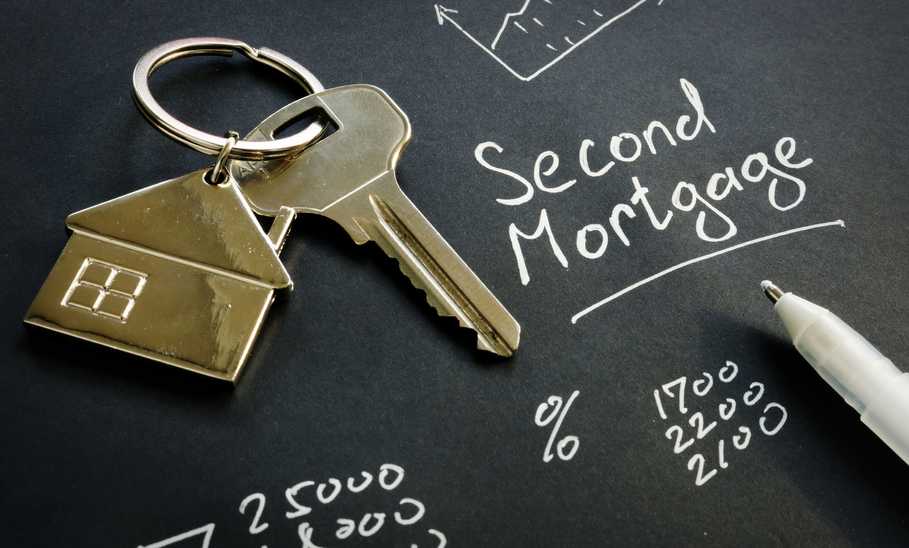What is A Second Mortgage & How Does It Work?

Our evaluations and opinions are not influenced by our advertising relationships, but we may earn a commission from our partners’ links. This content is created by TIME Stamped, under TIME’s direction and produced in accordance with TIME’s editorial guidelines and overseen by TIME’s editorial staff. Learn more about it.
Appreciation on homes is expected to have increased by around 10% in 2022, according to Realtor.com, with another expected increase around 5.5% in 2023. For people who already own their home, that increase in value means an increase in equity.
A second mortgage is one you take out against the equity in your home. Your existing mortgage stays in place and doesn’t change. You can use a second mortgage to pay for major expenses like debt repayment, renovations on your home or putting away money towards your child’s future college costs.
Understanding what a second mortgage is and when it’s best can help you decide if this option is right for you.
A second mortgage is a loan you take out in addition to your first mortgage. You use the equity in your home as collateral to get the second mortgage. The equity is the current market value of your home minus the balance on your existing mortgage.
When you take out a second mortgage, you now have two home mortgages and two mortgage payments. Both might be with the same lender or with different lenders. You are responsible for making both mortgage payments each month according to the terms of each separate loan.
If you default on either mortgage, the default lender may foreclose or take other measures to satisfy the loan.
A second mortgage works similar to a first mortgage. You have to complete an application and submit documentation to the lender about your finances and debts. The lender may require you to get an appraisal on your home that proves the value.
Borrowing requirements vary by lender. Most lenders want the home to have at least 15%-20% equity available. You can usually borrow up to 85% of the home’s current value, minus your first mortgage balance.
There are also usually minimum credit score requirements of 600 or better, though some lenders may have lower requirements. Keep in mind, the better your credit score, the better the interest rate and repayment terms. Most lenders also want to see a debt-to-income ratio of 43% or less.
For example, if your home is worth $400,000 and you still owe $250,000, you could potentially borrow up to $90,000 for a second mortgage ($400,000 x 0.85 - $250,000).
There are two main types of second mortgages: a home equity line of credit (HELOC) and a home equity loan.
A HELOC is similar to a credit card. The lender approves a line of credit based on your available equity. You can then use the funds as needed, whether you take out a lump sum or several small amounts over time. This may be the best option if you have a long-term home project with costs due over time or have plans to use it in the future but aren’t sure when.
A home equity line of credit differs from a credit card, however, because of draw periods. A draw period is the time frame you can access the money, which is usually 10 years from the time you take out the line of credit.
During the draw period, you only have to pay back the interest, but you can pay back more if you want. Once the draw period ends, you get more time, usually up to 20 years, to pay back the borrower amount, plus interest.
Make sure you understand the terms of your HELOC and read the fine print on your documents before making a withdrawal. Ask your lender questions if you need to so you don’t risk having your house seized for violating your payment terms.
With a home equity loan, the lender gives you a percentage of the home’s equity in a lump sum to use however you want. It’s like your first mortgage, with predictable payments that are spread out over a set number of years. Loan terms are generally between 5 and 30 years.
You pay back the home equity loan in monthly payments until you repay the loan. Just like your first mortgage, the lender records the lien against the home. If you don’t repay the loan, they can foreclose on the home.
A second mortgage is a great solution for repaying high-interest debt, consolidating multiple debts into one manageable payment or renovating your home. But you have to factor in fees, expenses and closing costs to see if it’s truly worth it. You could pay thousands of dollars upfront to access the equity in your home through a second mortgage.
A HELOC offers variable interest rates, which is usually best when interest rates are low. But with interest rates rising and continuing to do so, a home equity loan may be a more affordable solution. It provides a fixed interest rate and predictable payments.
Both home equity loans and HELOCs can be long-term commitments. If you sell your home before you pay off your second mortgage, the loan balance comes due immediately. Any outstanding balance will lower what you take home from the sale, even if the renovations don’t increase the value of your home.
If you’re considering taking out a second mortgage on your home, consider the pros and cons first.
Pros
Cons
If you have equity in your home, you can take these steps to get a second mortgage:
A cash-out refinance differs from a second mortgage because it replaces the original mortgage with a new loan instead of adding a second lien. The amount you “cash out” is added to the original loan balance.
Cash-out refinance interest rates are usually higher than a refinance without cash out, but are lower than second mortgage interest rates. You also don’t have to worry about two separate mortgage payments with a cash-out refinance.
Since a cash-out refinance is a new mortgage, closing costs can be higher than for a second mortgage. Weigh your options, including interest rate, fees and closing costs, to determine whether a second mortgage or cash out refinance is best for you.
If you have enough equity in your home, you can use a refinance to pay off your second mortgage. The refinance loan would take the place of both your first and second mortgage, so you only have one monthly payment instead of two.
It can be a good idea to get a second mortgage to pay off debt if you have high-interest debt. But keep in mind, credit card debt is not secured debt unlike a second mortgage, which is secured by your home’s equity. If you don’t repay your credit cards, the credit card company can’t come after your home, but if you don’t pay your mortgage your mortgage lender can take your home.
If you have debt, you want to make sure you have a plan in place to avoid more debt in the future. An app like Quicken may be a solution. Not only can you use it to create a realistic budget, but you can also discover new and smarter ways of saving your money.
When you apply for a second mortgage, the lender will do a hard credit check to find out your credit score and assess your creditworthiness. Your credit score and history will also determine your second mortgage interest rate. Multiple inquiries from lenders could hurt your credit score. Not making payments on time, skipping payments or defaulting on your loan agreement will also hurt your credit score.
Second mortgage rates are usually higher than first mortgage rates, though they are still lower than credit card and personal loan rates. If your house goes into foreclosure, the second lienholder only gets paid after the primary mortgage holder, which puts the second mortgage at higher risk of not being paid in full, driving higher interest rates.
A home equity loan and home equity line of credit are both types of second mortgages. Whether you get a home equity loan or HELOC, the lender places a lien against the home in case of nonpayment. If you fail to pay, the lender can foreclose on the home.
The information presented here is created by TIME Stamped and overseen by TIME editorial staff. To learn more, see our About Us page.



